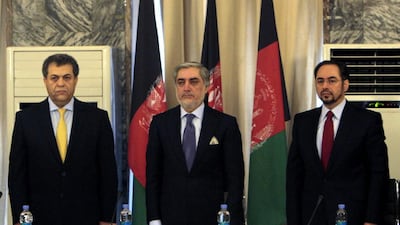KABUL // Afghanistan’s fragile unity government is struggling to name ministers to key cabinet positions, raising questions about further political instability in the country.
The presidential election last year was only decided after months of negotiations led to a US-brokered compromise agreement between Abdullah Abdullah, who became chief executive, and Ashraf Ghani, who became president.
The new administration then struggled to come up with a list of potential ministers that would satisfy their supporters. Candidates were finally presented to parliament on January 20, but several of them have since been rejected or dropped out, leaving only nine new cabinet members out of a possible 27 to be sworn in on Sunday earlier this week.
For now, vacant positions are filled by temporary replacements and it’s unclear how long the deadlock will continue. Parliament is due to close until March for a winter break and there is public dismay at the current impasse. The government has said it may try to recall MPs in an effort to resolve the problem.
One of the points all sides seem to agree on is that the political transition must continue to move forwards. With the economy in decline and a Taliban offensive expected in the spring, time is short.
Shukria Barakzai, an MP for Kabul, told The National the original list of ministerial nominees had left parliament with a dilemma.
“There are good personalities in it, experienced people and young women,” she said. “But there are also people with no experience and with the kind of habits that cannot be used to run a ministry. Anyway, the important point is that the government should be formed — this is the demand of the nation.”
While some key posts have been filled, including the ministers of interior, finance and foreign affairs, and the head of the intelligence service, positions in defence, economy, higher education and transport are among those still vacant. No women have been approved so far.
The selection process has at times verged on the farcical, with a physical fight between two female MPs and the revelation that the original pick for minister of agriculture is wanted by Interpol.
When the names were initially announced, after months of negotiations between the teams of Mr Ghani and Mr Abdullah, some observers praised the choices as a change from the politics of old when influential figures from the anti-Soviet resistance had dominated the administration of former president Hamid Karzai.
But the candidates quickly proved divisive, prompting a fresh power struggle that Afghanistan can ill-afford.
How the situation reached this point is disputed; many of the nominees fell foul of regulations that the administration must have known about in advance.
Several held dual citizenship, which ordinarily bars nominees from cabinet positions. Some have since given up their second passports and been approved, including the new foreign minister, Salahuddin Rabbani, who also held a British passport.
One female candidate was accused of being below the required age limit of 35, while the nominee for the ministry of women’s affairs was blocked because she had not yet formally graduated from university – another requirement.
Members of parliament told The National that certain candidates had been rejected because they were not qualified or had areas of expertise better suited to other positions. But they acknowledged that murkier factors were at work as well.
Abdul Hafiz Mansoor, an MP for Kabul, served in the same mujahideen party as Mr Abdullah during the fight against the Soviets and the subsequent civil war. He said “hidden” and “private” grievances served as motivations for some of his colleagues’ decision-making.
“It is difficult to say the government will collapse because it is slow and because it has too many internal differences and too many enemies,” he said. “But we can say that if the government goes forward as it is now it will not have a good future.”
Mr Ghani and Mr Abdullah may also be paying the price for their election campaigns, when they both had to win the support of high-profile figures by offering them influence in any future government. Now in a coalition together, they are finding those promises hard to fulfil.
In some cases, political patronage in Afghanistan goes hand in hand with more complex social issues such as ethnicity and religion.
Former members of the mujahideen in parliament, government and elsewhere are often suspicious of Mr Ghani, who was educated in the United States and spent much of his life abroad while wars raged inside Afghanistan.
Some of them are also worried by parliament’s decision to approve a senior figure from the communist era, Noor ul-Haq Ulumi, as the new interior minister.
Khalil Ahmad Shaheedzada, an MP for the western province of Herat, told The National that problems were to be expected in a coalition government that is "a new model for our people".
Despite this, he was unhappy with many of the nominees that had been put forward and said it is vital that people are appointed on merit.
“If it is about taking credit and people hiring their own men, it is dangerous for the future and will threaten Afghanistan,” he said.
foreign.desk@thenational.ae

